It is the last day of May and another wet, miserable day. (Hurry up global warming I say, at least here in Brighton.) As a consequence I have spent the morning constructively mooching around the web before remembering to pay a visit to a blog I came across sometime ago. If anyone wants to see just what a blog can be, there is no better example than
Petite Anglaise .
As the author outed herself, or more accurately was outed with the benefit of an additional ‘s’, i.e. ousted, by her former
employers for blogging, I can name her as Catherine Sanderson. Happily, Catherine won her claim for
unfair dismissal in March this year and was awarded €44,000 damages plus costs. (I discover in the same article that this practice of being fired for blogging is known as being dooced ‘in honour of the American designer and blogger Heather Armstrong, writing under the pseudonym Dooce, who was fired in 2002’.) The event hasn’t caused Catherine permanent damage. Her sudden leap to fame brought an invitation to appear on
Richard ‘n Judy (ok, that must have hurt) and a two book deal with Penguin.
In a
recent article for The Guardian, Catherine writes of the dangers of blogging, specifically with regards to employment, but also the fact that your once closely guarded anonymity can be compromised. Now, the fact is I have never made any attempt to preserve my privacy online and, to be honest, as a writer I don’t want to. I don’t pretend that anything I write is necessarily the truth. I use this space to muse, scribble, fantasise, and invent. Or, rather, I will use this space to muse, scribble, etc. However, I recently had occasion to reconsider my brashness when I came across a horrific example of cyber-stalking as documented by the blogger,
Rachel from North London. I only skimmed some of the history but it appears some lunatic called Felicity Jane Lowde has hounded this unfortunate woman for over a year. Despite court orders and the like she is still the target of this woman’s unwarranted venom.
I do envy Petite Anglaise and not just for her facility with words but also because she lives in Paris. I too once resided there for a couple of years. As you can see, I lived in the 5eme arrondissement, a mere 200 metres from Notre Dame (which was handy as I was a practising Catholic in those days).

Be you of the faith or not and if you’re ever in that city, take time out to visit the cathedral when they hold a recital there or a sung Mass. The music gathers in a cloud that seems to float overhead in a manner that is, in the true sense of the phrase, awe inspiring. I don’t suppose it is any accident that the acoustics create such an effect as I am sure that that was precisely the desired outcome of the generations of builders who constructed the building.
These images, which I have borrowed from Wikipedia, contrast Notre Dame post its recent restoration to the state it was in at the turn of the last century.


Notable is the state of all the buildings on the Île de la Cité, which look uniformly grim in their soot. One can only imagine that every major city throughout Europe must then have appeared equally forbidding. Indeed, I remember as a boy being driven through Liverpool, en route to the station and the miserable journey that would take me to my boarding school, and thinking how black and dirty everything seemed compared to the clean, rain-washed Welsh town of
Dolgellau where we then lived. (And, I hasten to add, this was
not at the turn of the 19th century.)
I loved living in Paris, especially once I had found my apartment. It was situated on the second floor and so typically had a balcony that ran the width of the building. This I could access through any one of three sets of windows that opened out on to it from my interconnected living rooms.


(The bloke having one of his many cheeks pinched, and who was as tall as he was wide, is Remy Fabrikant, a Swiss German/French art director who greatly enhanced my life in Paris. I miss him and his gargantuan appetite for life.) All the rooms, bar the kitchen, were stately in their proportions and as I only ever used the kitchen to boil the kettle I didn’t really care how small it was.
Regularly on my way across le Pont St Louis, which connects the two isles in the Seine, towards my favourite bar in the Marais, le Petit Feu à Cheval, rue Vieille-du-Temple, I would pause to look downstream towards the Eiffel tower across the floodlit brilliance that is Paris at night and pinch myself just to check I was actually present.
I have always been a Francophile and rue the fact that my mother, who spoke perfect French, never conversed to me in that tongue from birth. So I arrived in France with slightly better than ‘O’ level spoken French, which didn’t improve much for the first six months as I was working in a small office of mixed nationalities, so everyone spoke English. However, after that period I was moved to work in the main agency (advertising) to work with a French art director, Hervé Plummet, whose English was worse than my French. My linguistic skills improved dramatically in a comparatively short period.
The urban myth is that all Parisians are markedly rude, even the French living outside the capital claim so, but I found them no ruder than Londoners and in certain ways friendlier. If you make the effort to speak their language, they’ll make the effort to pretend to understand. Early on in
ma vie en Paris I went to buy a ticket for the Metro.
‘Un billet à l’Odeon, si vous plaît,’ I asked in my politest French.
Unfortunately no one had informed me that double ‘l’ after an ‘i’ is, in most cases and certainly this, silent. What I had in fact asked for, as any French speaker will tell you, is a billet, or a bed, to the Odeon. Eventually the laughter on the other side of the grille died down but only after I had blushed to the roots of my hair (not a claim I could make now) wondering precisely what I had said. I just thought if I have to make an arse of myself every time I open my mouth in order to learn this language then arse it is. And
cul it was.


 (Jimmy Edward’s figure could best be described as dumpy. I remember once watching him play polo, a sport of which he was particularly fond yet totally unsuited. He was as elegant in the saddle as a sack of potatoes on a seesaw.)
(Jimmy Edward’s figure could best be described as dumpy. I remember once watching him play polo, a sport of which he was particularly fond yet totally unsuited. He was as elegant in the saddle as a sack of potatoes on a seesaw.)





























